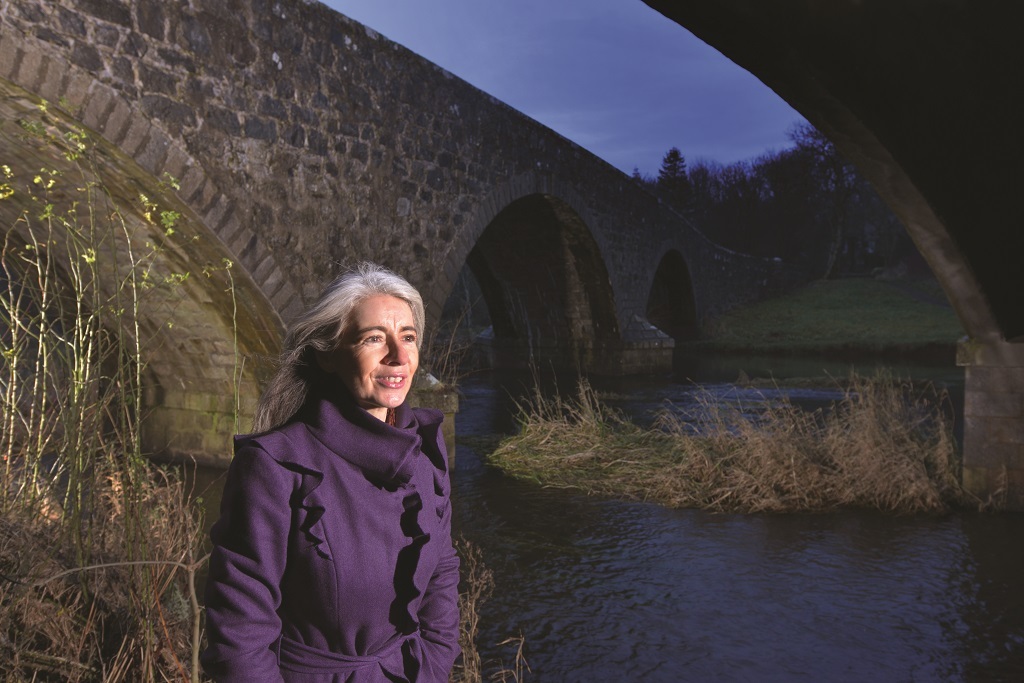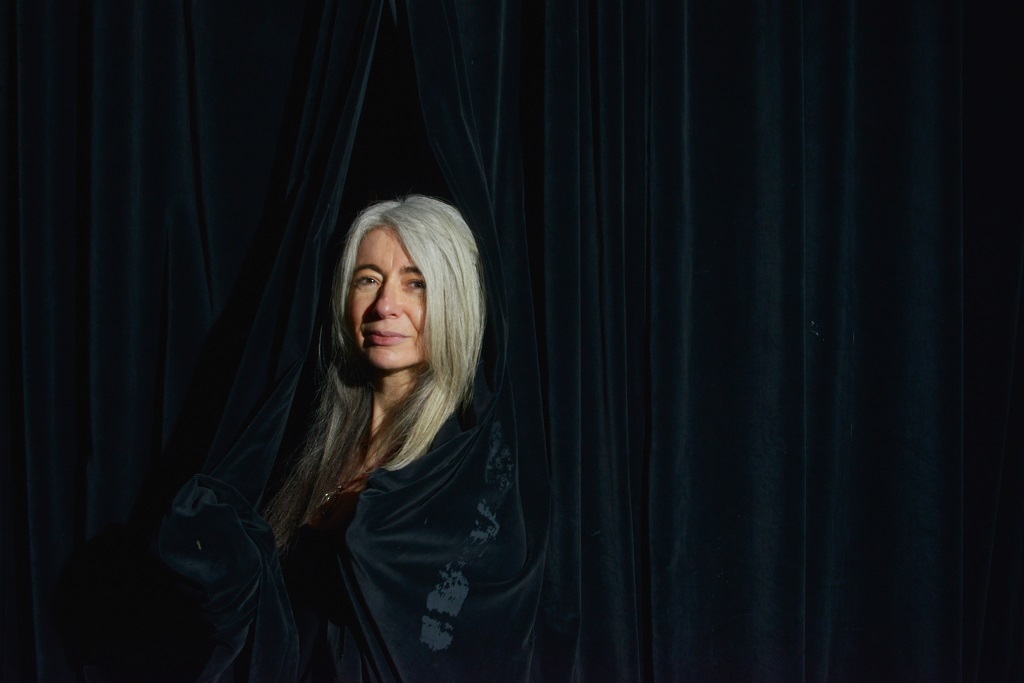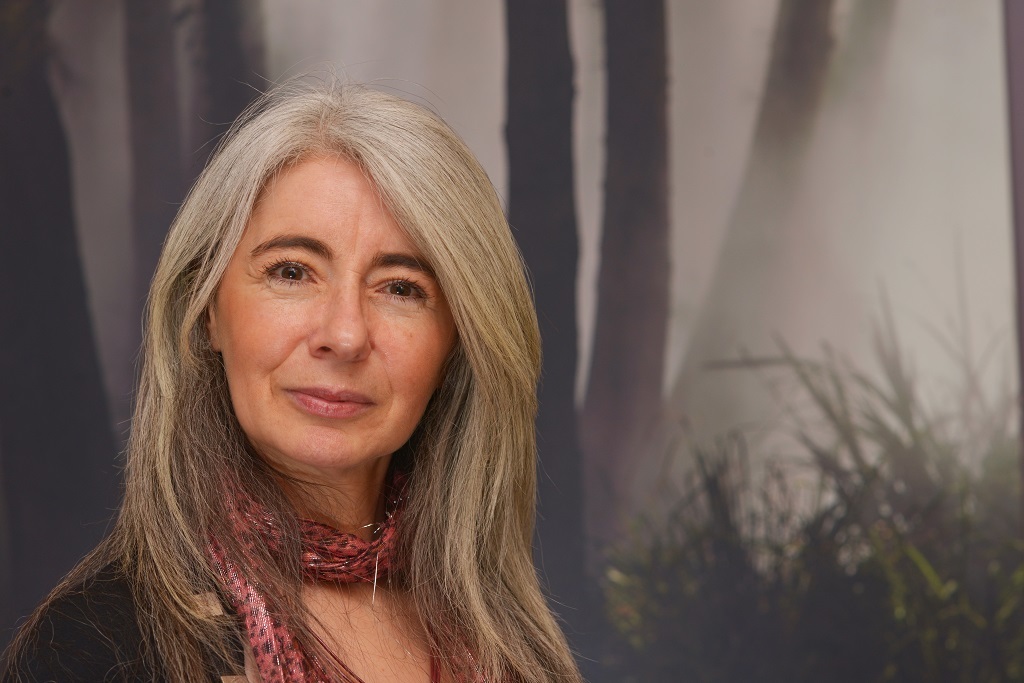The world’s first full-time solo percussionist, Dame Evelyn Glennie, profoundly deaf since the age of 12.
In this interview, originally published in Scottish Field’s April 2017 edition, she revisits the rural community in Aberdeenshire where she grew up.
I was born in Aberdeen in 1965, the youngest of three kids. My parents were desperate for a daughter but having had my second brother they had given up, so apparently I was a mistake.
I grew up on the family farm near Methlick; it’s a very different farm now, but in those days it was mixed livestock with cattle, cows, sheep and hens plus mixed arable land. My father was the youngest of 14 children so he had to leave school early and start work. Farming was what his side of the family did and also my mum’s side, so I had an agricultural upbringing.
We had this large shed of battery-caged hens and I would whizz around on my tricycle as a toddler with my mum shouting at me ‘don’t scare the hens’. Once I was a little older, my job was to collect the eggs and put them in the cartons, or to separate what we called ‘softies’, the eggs without shells.

I have happy memories of growing up on the farm because you had complete freedom and there were no issues with kids being around livestock or machinery, so the sense of trust and responsibility was in our systems right from the word go.
We would be expected to do all sorts of jobs on the farm, from feeding the cattle to looking after the sick lambs, which was one of my jobs. If they survived I would go to the mart with dad and get the money for selling them.
I went to Cairnorrie Primary School, the same school my dad and my two brothers went to. We would cycle or walk to neighbouring farms to play with local kids and at the weekends (not school days) we could stay out until any hour. Our parents would never worry, they knew that you were somewhere else but in safe hands. It was very nice but at the same time we were expected to do a lot.
I always saw my parents work; we didn’t go on holidays and things like that, our holidays were on the farm. I saw these two people working very hard indeed, because they are farmers and that’s what they do.
Mum made her own butter and cheese and we would have porridge every morning. Dad would milk the cow, it would be put in a jug and we would have it with our porridge. Vegetables, potatoes, that kind of thing, were all grown on the farm and in the October holidays we were all sent out to other farms to pick tatties. That is how we earned money to buy Christmas presents and things for ourselves, or we saved the money. So we worked from a young age, earning £5/£6 a day, a good farm might pay £8 a day and a very good farm would pay £10 a day. In those days that was a lot of money, thank you very much.

There was always a piano in the house and my mum could read music and play hymns. My father used to play the accordion in a dance band but when we were born that all stopped. He never played in front of us, but he had a very good ear for Scottish traditional music so I think my interest in music came from them both. But like any kid I would bang around on the piano until eventually at the age of eight my parents thought ‘maybe we should find a teacher and see what happens’.
I was quite happy to practise or just play, then at the age of 10 I saw a clarinet in an orchestra on television and I thought ‘hmm, I like that instrument’. So I asked for clarinet lessons, which lasted for about a year.
Then I went to Ellon Academy which was a revelation because all new pupils got to see the orchestra play during assembly. I looked around the orchestra and thought ‘wow I really want to be part of that’ and then I looked at the sections and saw the percussion and thought ‘oh that seems quite interesting’. Again I asked to have lessons, which of course were free through the school system.
There were 1,200-1,300 pupils at the school and a lot of them wanted to play percussion, so I had to wait my turn and do a mini audition until eventually I was given the chance to try percussion and I’ve never really looked back. I gave up the clarinet.
Ellon Academy was one of the first community schools in the area and it was an all-inclusive school with teachers for the hearing impaired, the sight impaired and for special needs kids. There was never a situation where a child was not accepted into any of the departments, with every door open to all kids.
It was a ‘can-do’ school with headmasters who had the ethos that every child has a story to tell and it was up to the school to plant the seeds, to listen, and to think: ‘in this school we’ve got a great chef, a great plumber, a great engineer, a great this and that…. we just need to find out what makes that person tick’. And that’s exactly what they did.
The only days we had off school were when we couldn’t get out of the farm because the roads were blocked by snow. My dad was the only farmer in the area that had a snowplough so he would try and clear as many of the side roads as possible. There were times when the only way to get into Methlick was on the tractor so sometimes that’s how we would go to church. The village has a lot of fond memories for me as we would play in the ruins all around Methlick church whenever my mum would take the kids choir. We were always getting up to mischief and hiding things or hiding ourselves in the church so that she couldn’t find us.
At night time that was when it was extra exciting. I also had to play the piano for Christmas concerts in the church or village hall, which I began to really not like; I began to slightly rebel, I guess. I think it was being forced to do something as opposed to wanting to do something. It didn’t sit well.
I used to play at nearby Haddo House whenever they needed a percussionist. Because my mum played the organ in Methlick church it was well known that I enjoyed that kind of thing and I was there, right on the doorstep. So that was wonderful because you were playing obscure music and you were working with a conductor and seeing how a rehearsal was knitted together. It was really good experience as you had less rehearsal time than with the school orchestra which meant you had to be on the ball as it was on a different level.
When I was 15 I decided that I would be a solo percussionist because that was the age where you had to refine your subjects. I was very keen on animals so for a while I thought I might do something with animals, like training them, but I had no ambition to be a vet. I liked music very much and thought I would give it a go but I had the simple aim that I would only go into music if I was to do solo percussion.
When I auditioned for the Royal Academy of Music in London to pursue a solo career, they really thought I had landed from Mars. They asked ‘what’s a solo percussionist?’ I said: ‘well you know what a concert pianist and violinist is, so try and visualise a concert percussionist.’ They pointed out that there was no repertoire to sustain a career so I told them we needed to find a way of creating the repertoire.

In those days we didn’t have the internet so I remember buying the British Music Year Book and writing to each composer by hand. I got a few replies, some said ‘Oh, yes I’ll write a two minute piece’, others said they would do it for a fee. In the end, the Aberdeen-born composer John McLeod wrote The Song of Dionysius, my Prom recital piece. I was very grateful for that piece and played it to death until more repertoire was written.
We’re also still developing a lot of percussion instruments. We used the Glennie aluphone for the first time at the London 2012 Olympics and it is still being developed. A lot of performers work closely with manufacturers, whether it’s tweaking existing instruments or making crude, homemade instruments. I recently brought out something called a barimbulum, which was inspired by a piece of farming machinery.
When I was a young musician starting out, I wanted to show everything including the kitchen sink, that’s just how you are at that age. But as the years have gone by, you suddenly realise, hold on I really just want to concentrate on that one surface to see what sound you could get out of it.
By seeing myself more as a sound creator rather than a percussionist, all the walls come tumbling down as it opens up other avenues of music. For me, that has been composing music for television adverts, for films, for radio documentaries, television documentaries. So you could wind up two music boxes and just let them be or you might just use a superball mallet and scrape it along a waterphone and you’ve got the most extraordinary soundscape.
My aim is to create a centre that is all about listening from all points of view, medical, sporting, business, everything. The accordion won’t continue playing, it has to wind down at some point, so you can either do that and give master classes, as most people do, or in my case create something like the centre where you’re still a musician.
We can be poor listeners and need to pay more attention, especially in the days that we are living in now, it is as crucial as ever.
TAGS

